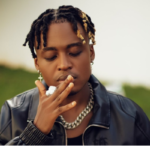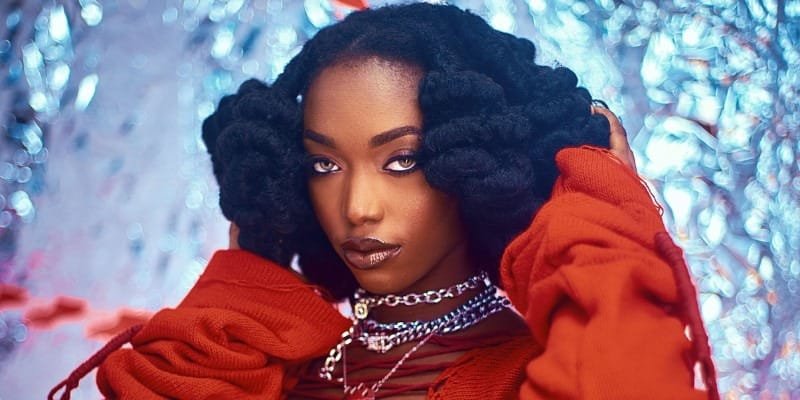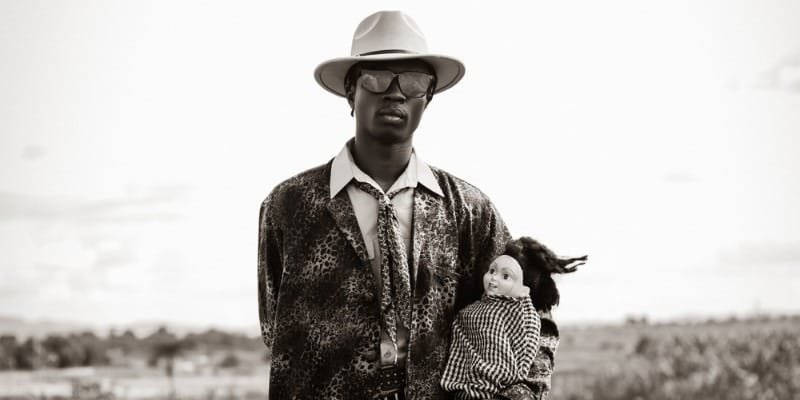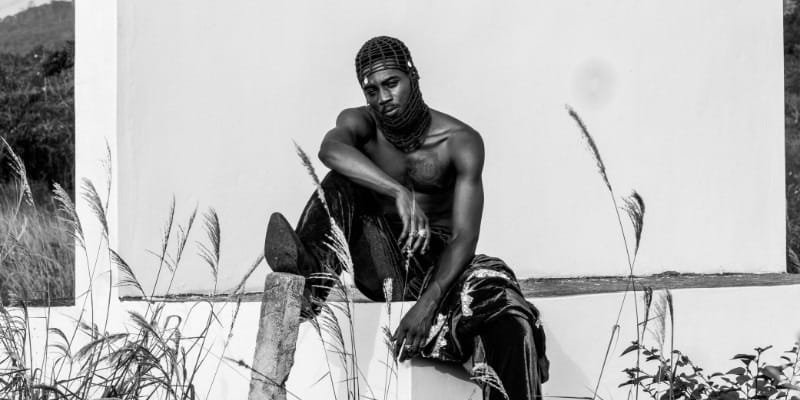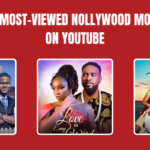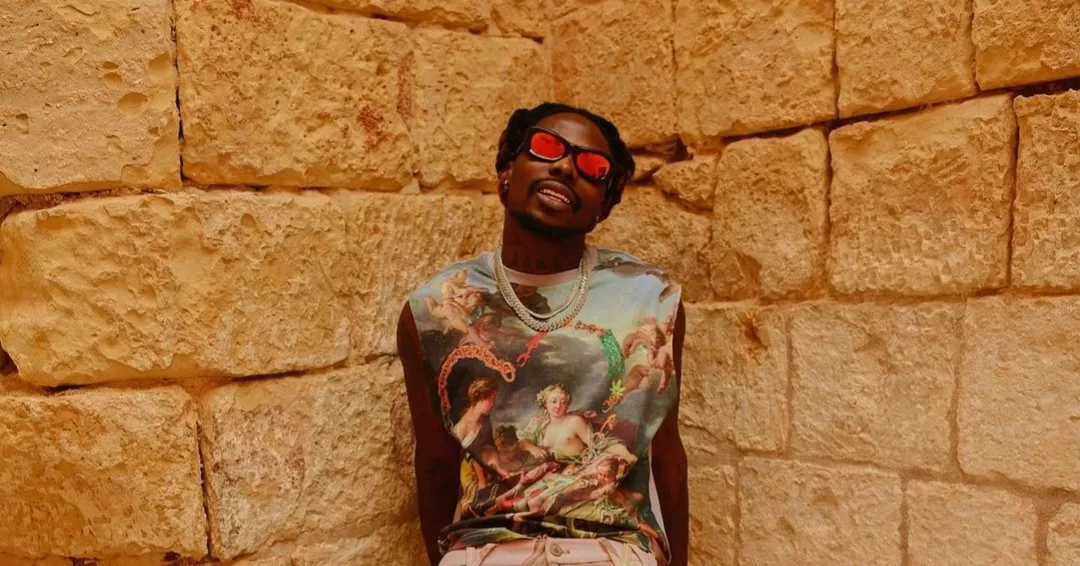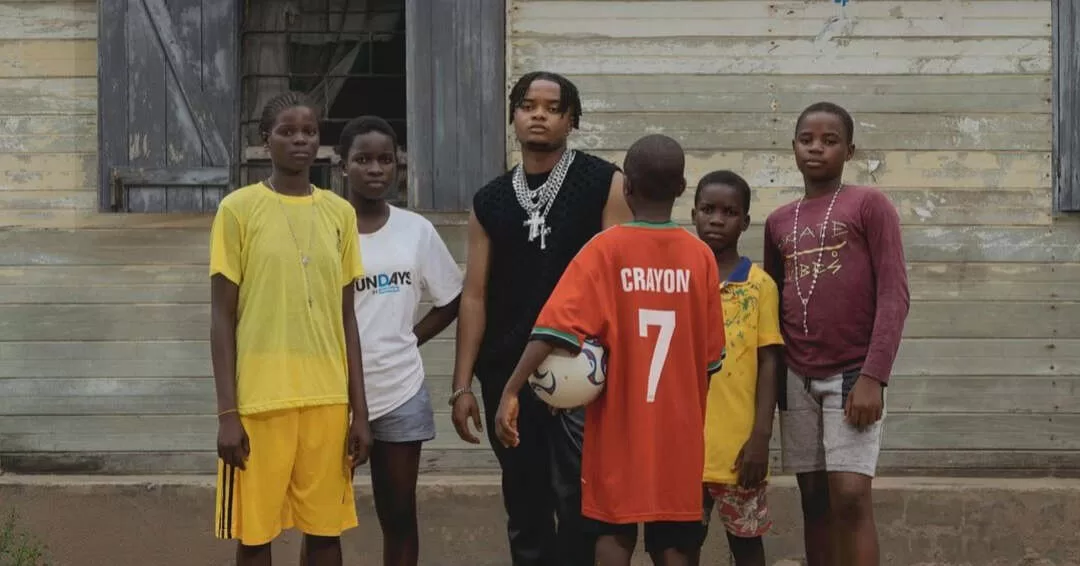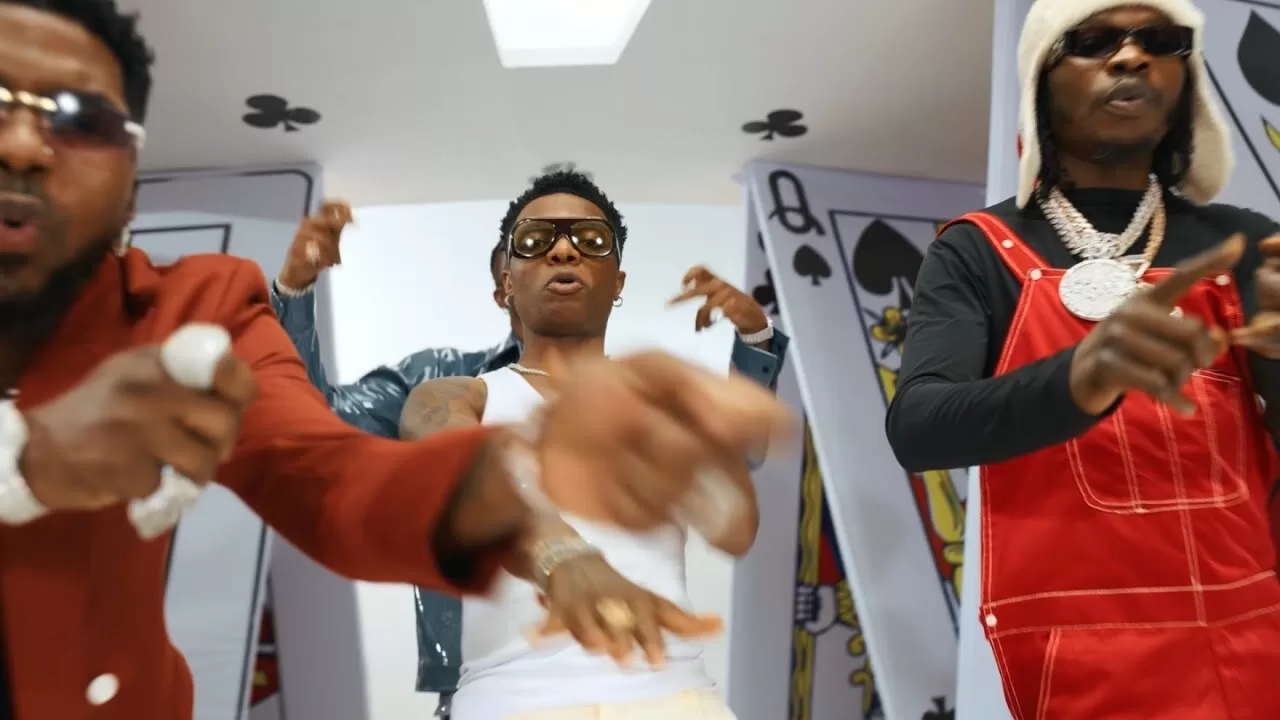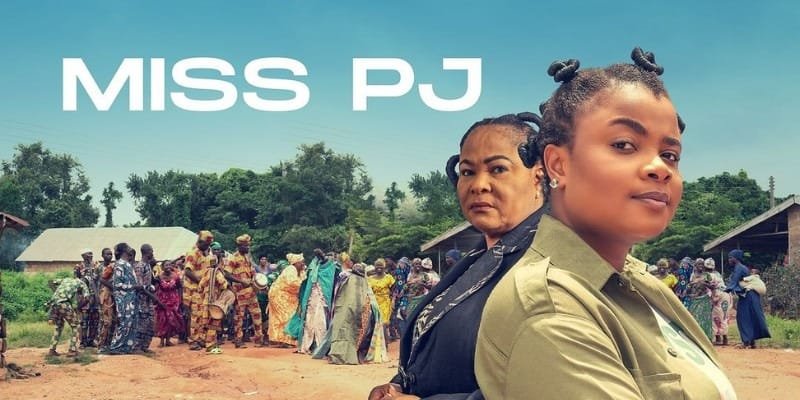“It’s you, Me, Us / Girl, it’s youuuu, Me, Us.” Those are the lyrics to Swayvee’s viral hit single Us. The song has quickly become one of the defining soundtracks of 2025, with its lyrics—centred on emotionally resonant themes like togetherness, loyalty, and emotional connection—serving as a rallying cry in a world more divided than it’s ever been.
“You know, there’s something I came across once — they said a good song is a great song, but a hit song is an intentional song. Us was made to actually unite people, bring people together, talk about relationships in different forms — not just the man and woman type — friendship, family, everything,” he tells African Folder about his hit single and the intention behind the record. With a 60-second runtime, the song’s sticky hook lands instantly, grabbing your attention and delivering its message.
The impact has been swift, with the record quickly catching fire on TikTok, inspiring creative content ideas that show off and celebrate relationships in various forms.
Since its release, the song has been featured in nearly a million videos on the platform — a number that’s poised to rise even further with the release of the remix featuring South African rapper Young Stunna.
For Swayvee, the success of the record is a culmination of years of relentless and strategic hard work. “Well, it’s been really exciting. I’m actually grateful. I’m happy. It’s something I’ve always dreamt of, and finally it came. So, yeah, I’m actually excited,” he says. The excitement is palpable during our virtual hour long conversation where he opens up about his journey and career.
Port Harcourt City and battle rap
His journey began in Port Harcourt City, where he started as a battle rapper going by the moniker Fatal Emcee. His love for hip-hop was inspired by MI Abaga’s Forever, off his classic debut album Talk About It. Being able to sing it word for word piqued his interest in music. “I was like, Yo, this is so cool. I’d like to make music someday,” he says.
As a battle rapper, he preferred to entertain the audience rather than bamboozle them lyrically like his opponents would prefer. He delivered clever and relatable freestyles that injected humour and vibes into every performance and won over the crowd even though his opponent may have delivered better verses.
His first recorded song was a freestyle done in one take, with no pre-written lyrics.
I recorded my first song in a studio called Nectar Studios. The name of the song was ‘Music and Hennessy’ and it was on the spot. It was not written — just straight up. I had no knowledge about bars, about a key, this key or that — they just put me on the microphone, just catching up with the beat, just vibing, and made a full song.
Swayvee, 2025.
Music was more of a creative outlet than a career goal. This sentiment changed after he discovered Canadian musician Tory Lanez in 2016. “Tory Lanez is the reason why I got up and said, ‘Yeah, I want to do music,” he tells African Folder. Tory Lanez’s talent, confidence, and come-up story inspired Swayvee to devote his focus to music.
Facebook and community building
Fueled by his newfound inspiration, Swayvee began posting freestyles and going live to perform freestyles on Facebook. These consistent freestyles helped him build an audience who would later form the bedrock of his devoted community. Facebook’s intimacy and accessibility helped him connect directly with his audience, forming a tight-knit relationship with them. In return, they championed his music, supporting his career every step of the way. “They saw me as their own project, that we need to take this person further, carry him like it’s our product. You check my comments, you’re always seeing them on TikTok, on IG. They’ll be like, ‘Yo, this is from Facebook. We are so proud of you he tells us.”
Facebook would also play a major role in helping him secure his first record deal. In a move to impress a girl he liked, he made a song to celebrate her birthday and posted the song to Facebook. A label manager would come across the song and offer him a record deal that kick-started his professional career. “That time, I had no plan, but the deal just came. I was like, ‘Oh wow, this is an opportunity. Let me hop on it. That’s how I got signed, and I moved to Lagos. That’s when I started my career professionally.”
It was at this label that he began to learn and understand the demands, intricacies and challenges of the music industry. One of those demands was the pressure to create marketable and money-making music. “When you’re signed to a label, you’re meant to make music that makes money, not just music that you like,” he explains. “I started off as a rapper, so trying to switch to Afro wasn’t working. It was a terrible experience for me.
Swayvee’s wave
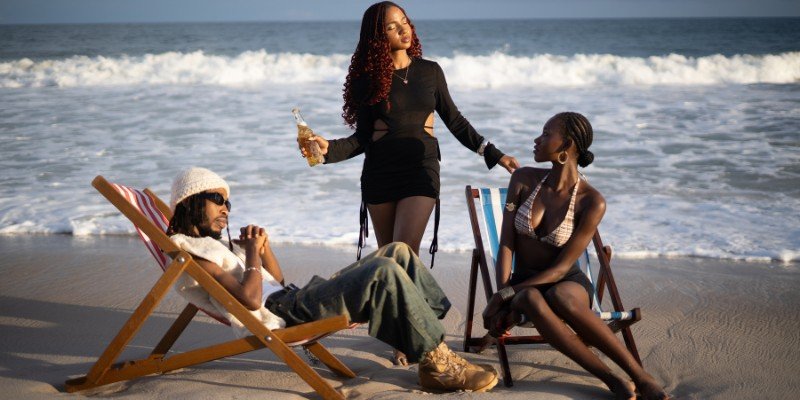
Rather than make a 180-degree switch from being a rapper to a singer, he adjusted his approach, refining his skills as a rapper into what he now calls the ‘Swayvee’s Wave’. “Since I was a rapper, I said okay, why not just continue writing my raps — but this time, sing them instead of rapping,” he says. He began adding melody to his flows, loosening up his structure, and began including Pidgin language in his music.
His battle rap background, as well as Port Harcourt’s textured soundscape, also contributed to the polished sound we hear from Swayvee today. “Port Harcourt has had, like, a very huge influence on how I approach music, even though I’m not much of the type that uses the lingua. But I built my sound from the core contour of Port Harcourt. I started off as a battle rapper, yeah. So that’s why most of my songs have hip-hop elements on them, no matter the genre. There’s always, like, hip-hop elements there, because I did not completely just switch. I just refined what I felt like was my sound and made it more interesting for people to listen to,” he tells African Folder.
He describes his sound as Swayvee’s Wave — a fluid, dynamic and emotionally resonant force that moves you whether you’re ready or not.
So there’s like a particular bounce to it. It comes like a wave as well. I like to call my sound Swave, meaning Swayvee Wave… calm, but can still sweep you off your feet if you’re not careful — even if you’re careful too, the wave can still carry you.
Swayvee, 2025.
Facebook also played a role in sparking his relationship with Yarden, one of his most potent creative partners. The two connected on the platform after Swayvee came across one of Yarden’s freestyle videos. “I was like, ‘Yo, I feel like your music. Come over, let’s just chill.’ So he came to the label house at the time. That was the first day we met, he says.” The meeting led to the creation of their first viral single Wild. A bouncy, heartfelt Trap single that showcased their chemistry.
The pair originally planned to drop the song independently and share it with their Facebook community, but the label intervened. They told us to cancel our plans. They had bigger plans for the song. I pushed back and told them, ‘If you want to do anything with this song, you’ll have to sign him,’ he says.
The gamble paid off. Wild took off, resonating far beyond their Facebook circle. The song blew up. It was big. It went everywhere. It changed so many things for me. That was peak exposure.
After Wild came DMS, another highly successful single that racked up impressive numbers across digital streaming platforms. His contract with the label expired in 2021, marking the beginning of his independent journey. I’ve been solo since then, he tells African Folder. A decision that would prove crucial to his artistic evolution. Now independent, he began experimenting with a more personal and vulnerable approach to his music.
The bandage bandit
It was during this period that he became the bandage bandit — a striking visual aesthetic where he appeared wrapped in bandages from head to toe. While many were quick to assume this was simply a marketing gimmick, Swayvee tells us this imagery reflected a deeply personal healing process. “My style at that time was able to interpret my feelings, because at that time I was going through like a rough patch,” he explains, choosing not to dive into specifics.
The imagery evolved from full-body coverage to gradual reveal, which indicated a slow but steady healing process. “It was more like the healing process — the whole bandage time was more like a healing phase for me. Like gradually, healing, healing, healing, until I took it off.”
As the bandage bandit, he released the Lost Files EP on the last day of 2021. The project, which his manager had to convince him to release, was a raw collection of demos and rough versions. Despite his reservations about the unpolished nature of the tracks, the EP resonated powerfully within his core fanbase and outside his fanbase, reaching #3 on the iTunes album charts and charting behind global superstars Adele and The Weeknd.
The EP featured standout tracks like Magical, Olosho, and Waka Waka Baby, each showcasing different elements of his artistry. For his devoted community, Lost Files represents a raw, unfiltered glimpse into their artist’s creative process during a transformative period.
The Jawdropper era
After the EP, Swayvee retreated from the public eye, entering what he describes as a strategic quiet period in 2022, a period he used to prepare for his next career arc. “I treat my career like an anime movie. There’s always arcs, there’s always eras. Sometimes you see the villain arc, you see the distinct arcs in anime,“ he explains.
His return came with Para featuring Zhus Jdo, a song that marked his expansion beyond his Facebook stronghold into other silos and showcased his growth. The success of Para also hinted at the larger audience he was beginning to capture with each release, feeling like a step towards something bigger.
“I manifested 2025 with my 2024 music,” he reflects. “I said ‘lies and lies have the truth you should believe. I’ve been underground. Now they are staring at my feet.’ I was talking about being the mastermind and how I’m being undermined. But soon everybody’s going to realise.”
The prophecy seems to be unfolding with the success of Us, with the song validating every prediction and strategic move.
While it was never intended as a single, the song has emerged organically from its creative process to its eventual release. Within weeks of its release, it had sparked nearly a million TikTok videos, been featured in marriage proposals, and inspired a remix with South African rapper Young Stunna that continues to expand its reach.
And now, that wave is finally crashing into the world stage. The success of Us is more than a fleeting moment in the Spotlight for Swayvee. It’s the culmination of years of artistic development and strategy. From his early days freestyling on the streets of Port Harcourt to freestyling on Facebook to his current international recognition, Swayvee has proven that authentic artistry, combined with genuine community building, can create waves that transcend borders and streaming platforms.
With a blockbuster EP on the horizon and an expansive audience finally getting swept by the wave he’s been building for years, Swayvee is on the cusp of greatness. For an artist who has always moved with intentionality, the moment feels inevitable — the perfect convergence of preparation and opportunity.



